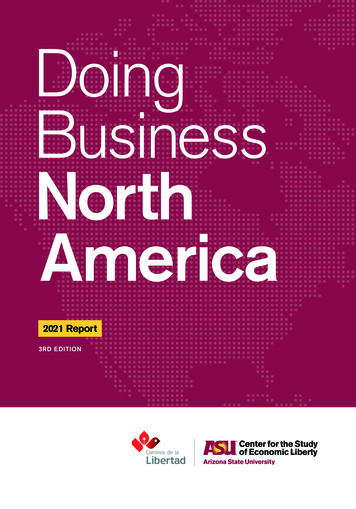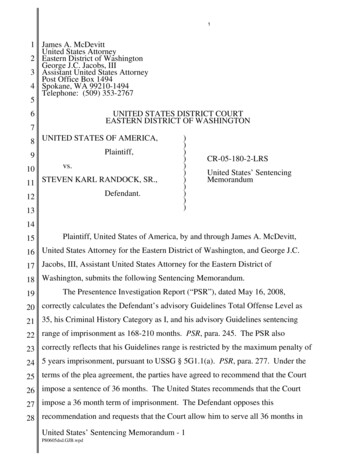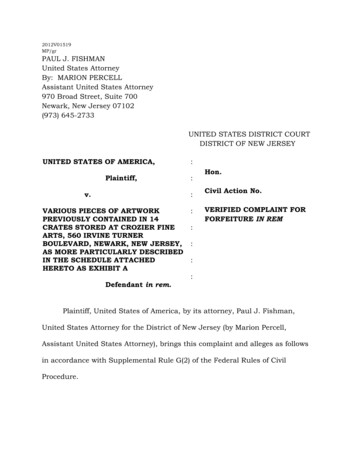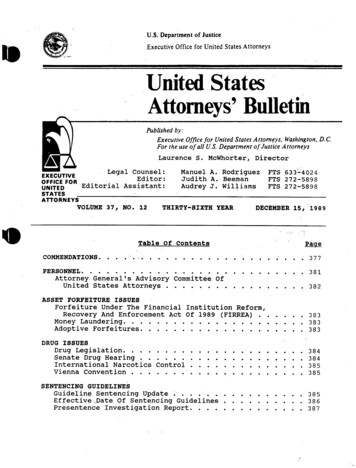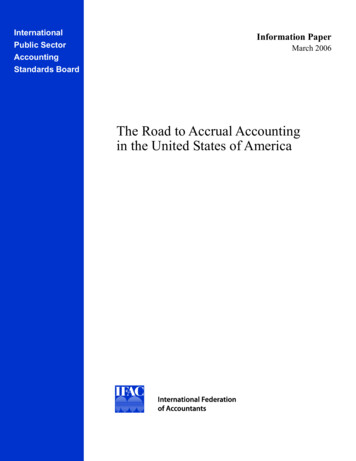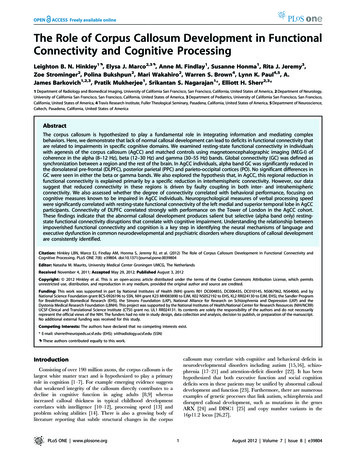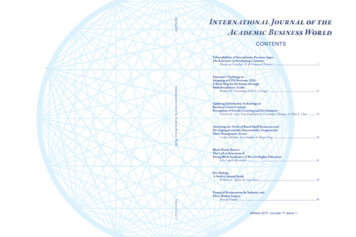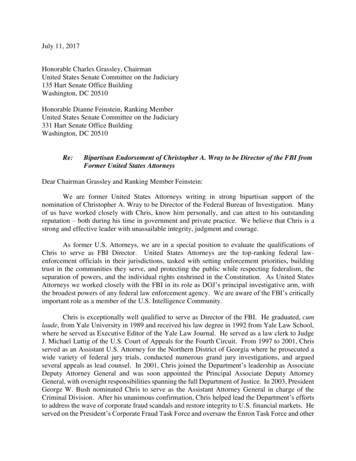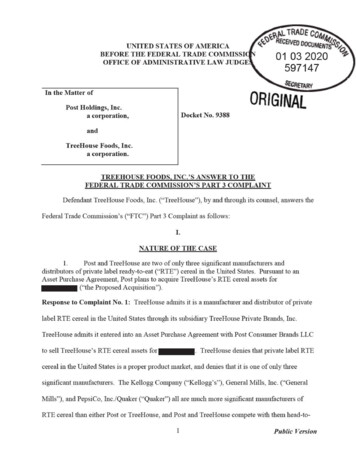
Transcription
UNITED STATES OF AMERICABEFORE THE FEDERAL TRADE COMMISSIOFFICE OF ADMINISTRATIVE LAW JUDGE .In the Matter ofPost Holdings, Inc.a corporation,Docket No. 9388andTreeHouse Foods, Inc.a corporation.TREEHOUSE FOODS, INC.'S ANSWER TO THEFEDERAL TRADE COMMISSION'S PART 3 COMPLAINTDefendant TreeHouse Foods, Inc. ("TreeHouse"), by and through its counsel, answers theFederal Trade Commission's ("FTC") Part 3 Complaint as follows:I.NATURE OF THE CASE1.Post and TreeHouse are two of only three significant manufacturers anddistributors of private label ready-to-eat ("RTE") cereal in the United States. Pursuant to anAsset Purchase Agreement, Post plans to acquire TreeHouse's RTE cereal assets for("the Proposed Acquisition").Response to Complaint No. 1: TreeHouse admits it is a manufacturer and distributor of privatelabel RTE cereal in the United States through its subsidiary TreeHouse Private Brands, Inc.TreeHouse admits it entered into an Asset Purchase Agreement with Post Consumer Brands LLCto sell TreeHouse's RTE cereal assets f o r . TreeHouse denies that private label RTEcereal in the United States is a proper product mru·ket, and denies that it is one of only threesignificant manufacturers. The Kellogg Company ("Kellogg's"), General Mills, Inc. ("GeneralMills"), and PepsiCo, Inc./Quaker ("Quaker") all are much more significant manufacturers ofRTE cereal than either Post or TreeHouse, and Post and TreeHouse compete with them head-to1Public Version
head. TreeHouse’s sales of RTE cereal in the United States comprise less thanpercentof total sales by dollar value. TreeHouse denies the remaining allegations in Paragraph 1.2.Respondents compete vigorously today. Respondents’ own internal businessdocuments show that the effect of the Proposed Acquisition “may be substantially to lessencompetition, or to tend to create a monopoly” in violation of the Clayton Act, and harm U.S.consumers. In internal business documents, both Post and TreeHouse recognize each other asclose competitors for private label RTE cereal business. Post historically has acknowledged thatTreeHouse is the “market leader” in the private label RTE cereal category and recognizes that ithas grown its own private label share by “stealing” volume primarily from TreeHouse.TreeHouse’s describes itself as the “#1 U.S. Private Label RTE Cereal Manufacturer.”TreeHouse correspondingly describes Post as its “largest private label competitor” and a “majorthreat” to take away private label RTE cereal business.Response to Complaint No. 2: TreeHouse admits that it competes with Post, but denies thatPost is its closest competitor. TreeHouse admits that the FTC correctly quotes a portion of itssales document, the Confidential Information Presentation (“CIP”), which described TreeHouseas the “#1 U.S. Private label RTE Cereal Manufacturer,” but denies this is evidence of a privatelabel only RTE cereal product market, or evidence that Post is its closest competitor. TreeHousefurther admits that “largest private label competitor” and “major threat” are accurate quotes fromTreeHouse documents. TreeHouse further states that it has voluminous internal businessdocuments demonstrating that TreeHouse competes vigorously with branded RTE cerealmanufacturers—Kellogg’s, General Mills, and Quaker—as well as other manufacturers likeGilster Mary-Lee Corporation (“Gilster”), Brüggen, Hearthside Foods, California CerealProducts, Organic Milling, and others. TreeHouse lacks knowledge and information sufficient toadmit or deny the contents of Post’s internal business documents, and, therefore, denies theallegations relating to such documents. TreeHouse denies the remaining allegations in Paragraph2.3.Respondents’ are often retailers’ two best options for private label RTE cereal.Retailers play Post and TreeHouse off each other to obtain lower pricing, better service, andother contract terms. Indeed, Post and TreeHouse frequently lower their prices and make otherconcessions to take business away from each other and to avoid losing business to each other.2Public Version
The Proposed Acquisition would eliminate this head-to-head competition and would give Postthe power and incentive to increase prices and decrease services for private label RTE cereal forretailer and their customers post-acquisition.Response to Complaint No. 3: TreeHouse lacks knowledge and information sufficient to admitor deny information pertaining to retailers’ beliefs about Respondents and retailers’ businessstrategies and, therefore, denies them. TreeHouse admits that it competes against Post.TreeHouse further states that retailers have many options for RTE cereal, and frequently switchfrom private label to branded cereal manufacturers or discontinue private label items in favor ofbranded RTE cereal items. TreeHouse denies the remaining allegations in Paragraph 3.4.Under the 2010 U.S. Department of Justice and Federal Trade CommissionHorizontal Merger Guidelines (“Merger Guidelines”), a post-acquisition market-concentrationlevel above 2,500 points, as measured by the Herfindahl-Hirschman Index (“HHI”), and anincrease in market concentration of more than 200 points, renders an acquisition presumptivelyanticompetitive. Based on volume of sales, the Proposed Acquisition would significantlyincrease concentration in an already highly concentrated market for the sale of private label RTEcereal to U.S. retailers, well beyond the thresholds set forth in the Merger Guidelines. Thus,under the Merger Guidelines, the Proposed Acquisition is presumptively anticompetitive.Response to Complaint No. 4: TreeHouse denies the allegations of Paragraph 4 that there is arelevant market for the sale of private label RTE cereal, that the merger is presumptivelyanticompetitive, that in a properly defined relevant market there is high concentration, or that themerger would significantly increase concentration. To the extent the allegations relate to theHorizontal Merger Guidelines, TreeHouse refers to the Horizontal Merger Guidelines themselvesfor their true and complete content. To the extent that a response is required as to the allegationsabout the Horizontal Merger Guidelines, TreeHouse denies that Paragraph 4 provides a true andcomplete characterization of the Horizontal Merger Guidelines, that Paragraph 4 properly applies3Public Version
the Horizontal Merger Guidelines to this case, or that the Horizontal Merger Guidelines canestablish that a merger is presumptively anticompetitive as a legal matter.5.New entry or expansion by current market participants would not be timely,likely, or sufficient to deter or counteract the likely anticompetitive effects of the ProposedAcquisition.Response to Complaint No. 5: TreeHouse denies the allegations in Paragraph 5. TreeHousefurther states that entry or expansion by current market participants would be quick, likely, andsufficient to deter or counteract any anticompetitive effects, evidenced by the numerousexamples of branded and other manufacturers entering private label manufacturing at a retailer’srequest, including in RTE cereal and adjacent categories. For example, Post beganmanufacturing private label RTE cereal at a large retailer’s request. Similar examples abound inother categories. Manufacturers with current RTE cereal capabilities—of which there are at leastten in the United States alone—could begin producing private label cereal with minimal capitalinvestment.6.Respondents cannot demonstrate cognizable and merger-specific efficiencies thatrebut the strong presumption and other evidence that the Proposed Acquisition likely wouldsubstantially lessen competition in the relevant market.Response to Complaint No. 6: TreeHouse denies the allegations in Paragraph 6. TreeHousefurther answers that the Proposed Acquisition will generate substantial merger-specificefficiencies resulting primarily from shifting production among facilities formerly owned byseparate entities that will be combined into one entity. These efficiencies outweigh anyhypothetical adverse competitive effects.II.JURISDICTION7.Respondents, and each of their relevant operating entities and parent entities are,and at all relevant times have been, engaged in commerce or in activities affecting “commerce”4Public Version
as defined in Section 4 of the FTC Act, 15 U.S.C. § 44, and Section 1 of the Clayton Act,15 U.S.C. § 12.Response to Complaint No. 7: The allegations in Paragraph 7 are legal conclusions to whichno response is required.8.The Proposed Acquisition constitutes an acquisition subject to Section 7 of theClayton Act, 15 U.S.C. § 18.Response to Complaint No. 8: The allegations in Paragraph 8 are legal conclusions to whichno response is required.III.RESPONDENTS9.Respondent Post, headquartered in St. Louis, Missouri, is a publicly tradedcorporation organized under the laws of Missouri. Post has offerings in the center-of-the-store,foodservice, food ingredient, refrigerated, active nutrition, and private brand food categories.Through its Post Consumer Brands unit, Post manufactures, markets, and sells a broad portfolioof well-known national RTE cereal brands, including Honey Bunches of Oats, Pebbles, andGrape-Nuts, as well as a variety of private label RTE cereal products. Post producesapproximately 28 formulations of private label RTE cereal and offers retailers natural, organic,and clean label private label RTE products. In fiscal year 2018, Post Consumer Brands’ retailsales of private label RTE cereal were approximately.Response to Complaint No. 9: TreeHouse lacks knowledge and information sufficient to forma belief as to the truth of the allegations in Paragraph 9 and, therefore, denies them.Respondent TreeHouse, headquartered in Oak Brook, Illinois, is a publicly traded10.corporation organized under the laws of Delaware. TreeHouse is a leading manufacturer ofprivate label food and beverage products across multiple categories, with total annual revenuesof approximately 5.8 billion in 2018. TreeHouse is the largest manufacturer of private labelRTE cereal in the United States through its TreeHouse Private Brands, Inc. subsidiary. In fiscalyear 2018, TreeHouse’s retail sales of private label RTE cereal were.Response to Complaint No. 10: TreeHouse admits that it is headquartered in in Oak Brook,Illinois, and is a publicly traded corporation organized under the laws of Delaware. TreeHouseadmits that it is a leading manufacturer of private label food and beverage products acrossmultiple categories, with total annual revenues of approximately 5.8 billion in 2018.5Public Version
TreeHouse admits that it is, or recently was, the largest manufacturer of private label RTE cerealin the United States through its TreeHouse Private Brands, Inc. subsidiary, but denies that privatelabel RTE cereal is a relevant product market. TreeHouse states that its revenue from sales ofRTE cereal in 2018 was, and states that its sales of RTE cereal declined by nearlyon an annual basis between 2016 and 2019. TreeHouse denies the remainingallegations in Paragraph 10.IV.THE PROPOSED ACQUISITION11.On May 1, 2019, Post and TreeHouse signed an Asset Sale Agreement pursuantto which Post will acquire TreeHouse’s private label RTE cereal business, includingTreeHouse’s RTE cereal product formulations and manufacturing plants. Post eventually plansto integrate TreeHouse’s private label RTE cereal business into Post’s existing private label RTEcereal business. The total consideration for the Proposed Acquisition is approximately.Response to Complaint No. 11: TreeHouse admits that Post and TreeHouse signed an AssetSale Agreement on May 1, 2019, pursuant to which Post will acquire TreeHouse’s private labelRTE cereal assets for approximately. TreeHouse lacks knowledge and informationsufficient to form a belief as to the truth of the remaining allegations in Paragraph 11 and,therefore, denies them.V.RELEVANT MARKETS12.The relevant market in which to evaluate the effects of the Proposed Acquisitionis no broader than the sale of private label RTE cereal to retailers in the United States.Response to Complaint No. 12: TreeHouse denies the allegations in Paragraph 12.A.Relevant Product Market13.The sale of private label RTE cereal to retailers is the relevant product market.6Public Version
Response to Complaint No. 13: TreeHouse denies the allegations in Paragraph 13.14.Post and TreeHouse each manufacture and sell RTE cereal. RTE cereal (or coldcereal) is food made from processed grains like wheat, rice, and oats that requires no preparationand no heating before consumption. RTE cereal is dry and sold in a variety of packaging (e.g.,boxes, bags and cups) and can be consumed dry or with milk. RTE cereal is a popular food: thecategory as a whole enjoys a household penetration rate over 90 percent, although consumptionhas gradually declined over time.Response to Complaint No. 14: TreeHouse admits that Post and TreeHouse each manufactureand sell RTE cereal. TreeHouse admits that RTE cereal (or cold cereal) is food made fromprocessed grains like wheat, rice, and oats that requires no preparation and no heating beforeconsumption. TreeHouse admits that RTE cereal is dry and sold in a variety of packaging,including boxes and bags, and can be consumed dry or with milk. TreeHouse admits that RTEcereal has approximately 90 percent household penetration, but states that its consumption hasplummeted in the last few years and it continues to lose consumers year over year. TreeHousedenies the remaining allegations in Paragraph 14.Respondents do not sell their RTE cereal products to end consumers. Instead,15.both Respondents compete to sell their RTE cereal to retailers, including conventional grocerystores (such as Kroger), discount supermarkets (such as Aldi), and mass merchants (such asWalmart). Some retailers purchase RTE cereal as part of a Purchasing Cooperative (such asTopco). The retailers then sell these RTE cereal products under the retailer’s proprietary tradenames (i.e., private labels) to their in-store customers, the end consumers.Response to Complaint No. 15: TreeHouse admits that it sells RTE cereal to retailers, and thatsome retailers purchase through cooperatives, although denies that it sells RTE cereal to onlyretailers. TreeHouse further admits that private label RTE cereal is sold to end consumers withlabels that TreeHouse’s customers own, and that TreeHouse does not own or otherwise control.TreeHouse denies the remaining allegations in Paragraph 15.16.Many retailers offer private label RTE cereal, among other private label products,in their stores. Private label products provide a lower-cost alternative to the national brands—due to lower advertising and marketing costs—while offering customers similar quality. Eachretailer’s private label brand is available only at that retailer’s locations. For example, Walmart’s“Great Value” private label RTE cereal product is only available at Walmart.7Public Version
Response to Complaint No. 16: TreeHouse admits that certain retailers offer store-brand orprivate label RTE cereal, and that some store-brand labels are available at only one retailer.TreeHouse admits that it competes with national brand RTE cereal manufacturers on price, withthe goal of offering a lower-cost alternative to end consumers. TreeHouse denies the remainingallegations in Paragraph 16.17.Typically, private label RTE cereals are “emulations” of popular RTE cerealnational brands; they are also referred to as “National Brand Equivalents” or “NBEs.” Forexample, Kroger may offer Kroger’s private label Honey Nut Toasted Oats cereal, whichemulates General Mills’ Honey Nut Cheerios.Response to Complaint No. 17: TreeHouse admits the allegations in Paragraph 17.18.While there may be some taste, appearance or quality differences between thebranded cereal and the private label emulations, the primary differences are the wholesale andretail prices. Branded RTE cereal prices are substantially higher than private label RTE cerealprices because they incur most of the costs of advertising or promotional efforts for theirproducts. By contrast, there is very little, if any, advertising or promotional spend by privatelabel suppliers. Therefore, there is usually a gap between the retail prices of branded and privatelabel RTE cereal products. This price gap will vary across retailers and across emulations, but istypically between 20 and 30 percent.Response to Complaint No. 18: TreeHouse admits that private label RTE cereal manufacturerscompete head-to-head with branded RTE cereal manufacturers, both on price and non-priceterms. TreeHouse further admits that private label RTE cereal manufacturers must priceproducts at a significant discount to branded RTE cereal for retailers to consider purchasingprivate label RTE cereal. TreeHouse further admits that retailers offer private label RTE cerealto end consumers at a significant discount to branded RTE cereal because end consumersdemand private label RTE cereal be priced lower than branded. TreeHouse lacks knowledge andinformation sufficient to admit or deny the remaining allegations in Paragraph 18 and, therefore,denies them.19.Generally, retailers do not view branded RTE cereals as interchangeable withprivate label RTE cereal products. For several reasons, retailers derive a unique value fromoffering private label RTE cereal, which they could not replicate by simply switching private8Public Version
label RTE cereal inventory over to branded RTE cereal products. First, retailers find it profitableto sell private label RTE cereal products and may earn higher margins on sales of private labelRTE cereal than they do on sales of branded RTE cereal. Second, retailers value having aprivate label RTE cereal offering because it allows them to offer a lower cost, but acceptablequality, option to consumers. Third, a retailer’s private label RTE cereal offering helpsdifferentiate that retailer from its competitors, and thereby helps promote the retailer’s brand andfoster customer loyalty.Response to Complaint No. 19: TreeHouse lacks knowledge and information sufficient toadmit or deny the allegations in Paragraph 19 and, therefore, denies them.20.For these reasons, Retailers would not switch their purchases of private label RTEcereals to branded RTE cereals in sufficient quantity or numbers to render unprofitable a smallbut significant non-transitory increase in price (“SSNIP”) on private label RTE cereal.Response to Complaint No. 20: TreeHouse denies the allegations in Paragraph 20. TreeHousefurther states that in addition to retailers switching from private label RTE cereals to brandedRTE cereal, end consumers would switch from private label RTE cereal to branded RTE cereal ifprivate label RTE cereal prices increased, and that this switching by end consumers must beconsidered in analyzing whether a SSNIP is profitable.The relevant market does not include “natural and organic” RTE cereal21.formulations. Retailers and end consumers do not view natural and organic cereals as substitutesfor conventional cereals. Retailers typically source conventional (i.e., non-natural/organic)cereals through separate processes, and many of the suppliers of natural and organic cereals aredifferent than the suppliers for conventional RTE cereals. Natural and organic cereals tend tohave healthier and more expensive inputs and are consequently priced significantly higher thantheir conventional counterparts. Thus, retailers could not effectively defeat a SSNIP onconventional private label RTE cereals by switching their purchases to natural and organic RTEcereals.Response to Complaint No. 21: TreeHouse lacks knowledge and information sufficient toadmit or deny the allegations in Paragraph 21 pertaining to retailers’ views and, therefore, deniesthem. TreeHouse denies the remaining allegations in Paragraph 21. TreeHouse further states thatin addition to retailers switching from conventional private label RTE cereal to natural andorganic RTE cereal, end consumers would switch from conventional private label RTE cereal tonatural and organic RTE cereal if conventional private label RTE cereal prices increased, and9Public Version
that this switching by end consumers must be considered in analyzing whether a SSNIP isprofitable.B.Relevant Geographic Market22.The relevant geographic market in which to assess the competitive effects of theProposed Acquisition is no broader than the United States. Customers based in the United Statescannot arbitrage or substitute based on different prices offered to customers outside the UnitedStates.Response to Complaint No. 22: TreeHouse denies the allegations in Paragraph 22.Competition among private label RTE cereal suppliers occurs at the national23.level. Many large retailers have locations in multiple regions across the United States, generallyselect a single supplier for all locations, and sell the same national sourced private label RTEcereal products across their entire retail footprint. Post and TreeHouse have national distributionnetworks to transport their private label RTE cereal throughout the United States. Post andTreeHouse each produce most of the private label RTE cereal they sell to U.S. retailers withinthe United States.Response to Complaint No. 23: TreeHouse admits that it sells RTE cereal throughout theUnited States. TreeHouse admits that it sells private label RTE cereal to U.S. retailers within theUnited States, and that many large retailers have locations in multiple regions. TreeHouse lacksknowledge and information sufficient to admit or deny the allegations pertaining to Post’sdistribution and sales and, therefore, denies them. TreeHouse denies the remaining allegations inParagraph 23.VI.MARKET STRUCTURE AND THE PROPOSED ACQUISITION’S PRESUMPTIVEILLEGALITYPost and TreeHouse are the two largest suppliers of private label RTE cereal to24.retailers in the United States.Response to Complaint No. 24: TreeHouse admits that both Post and TreeHouse manufactureprivate label RTE cereal, but denies that the sale of private label RTE cereal to retailers in the10Public Version
United States is a relevant product market. TreeHouse lacks knowledge and informationsufficient to admit or deny the remaining allegations in Paragraph 24 and, therefore, denies them.25.There is only one other meaningful private label RTE supplier, Gilster-Mary Lee.Other private label RTE cereal suppliers are significantly smaller than Respondents are and havelimited competitive significance. For example, the most prominent foreign manufacturer,Brüggen, accounts for less than one percent of private label RTE cereal sales in the UnitedStates.Response to Complaint No. 25: TreeHouse admits that Gilster is a meaningful RTE cerealsupplier. TreeHouse denies the remaining allegations in Paragraph 25.26.Combined, Post and TreeHouse would account for overof the marketfor the sale of private label RTE cereal to retailers in the United States. Based on Post’s ordinarycourse documents, in 2018, TreeHouse held ashare of the private label RTE cerealmarket, followed by Post with, and Gilster-Mary Lee with. The remainderis a mix of all other suppliers, accounting for about.Response to Complaint No. 26: TreeHouse denies the allegations in Paragraph 26 because theshares purport to describe a “market” that does not exist.27.The 2010 U.S. Department of Justice and Federal Trade Commission HorizontalMerger Guidelines (the “Merger Guidelines”) and courts typically measure concentration usingthe Herfindahl-Hirschman Index (“HHI”). The HHI is calculated by totaling the squares of themarket shares of every firm in the relevant market. Under the Merger Guidelines, a merger ispresumed likely to create or enhance market power—and is presumptively illegal—when thepost-merger HHI exceeds 2,500 and the merger increases the HHI by more than 200 points.Response to Complaint No. 27: TreeHouse denies the allegations in Paragraph 27.28.Based on Post’s ordinary course estimates of market shares, the ProposedAcquisition would result in a post-acquisition HHI exceeding 5,000, with an increase of morethan 2,000, in a market for the sale of conventional private label RTE cereal to retailers in theUnited States. These concentration levels are well beyond what is necessary to establish apresumption of competitive harm.Response to Complaint No. 28: TreeHouse denies the allegations in Paragraph 28.29.Evidence showing that the Proposed Acquisition would substantially lessencompetition and result in significant anticompetitive effects bolsters the presumption ofcompetitive harm.11Public Version
Response to Complaint No. 29: TreeHouse denies the allegations in Paragraph 29.30.The Proposed Acquisition is presumptively illegal under relevant case law and theMerger Guidelines.Response to Complaint No. 30: TreeHouse denies the allegations in Paragraph 30.VII.ANTICOMPETITIVE EFFECTS31.The Proposed Acquisition would eliminate substantial direct competition betweenPost and TreeHouse, resulting in increased prices for retailers and end consumers.Response to Complaint No. 31: TreeHouse denies the allegations in Paragraph 31.A.The Proposed Acquisition Would Eliminate Vigorous Competition and Result in HigherPrices for Retailers and End Customers32.Respondents are close competitors and two of only three meaningful suppliers ofprivate label RTE cereal in the United States. TreeHouse and Post are the only twomanufacturers viewed as alternatives by many retailers due to their scale, prices, breadth ofproduct offerings, and quality. As a result, Respondents are the first and second choices for mostretail customers, and predominantly compete against each other to be a retailer’s private labelproducer.Response to Complaint No. 32: TreeHouse lacks knowledge and information sufficient to forma belief as to the truth of the allegations regarding how retailers view purchasing decisions and,therefore, denies them. TreeHouse denies the remaining allegations in Paragraph 32.33.Retail customers benefit from the competition between Respondents because theyuse this competition to secure lower prices for private label RTE cereal.Response to Complaint No. 33: TreeHouse denies the allegations in Paragraph 33.Private label competition can take place during a “request for proposal” (or RFP)34.process, or through informal negotiations, or some combination of the two. Typically, theprivate label supply process begins with an RFP in which the retailer sets forth its requirementsin terms of desired private label RTE cereal product, desired nutritional requirements (e.g. noartificial coloring), package size, and terms of delivery and payment. Private label supplierssubmit bids and the retailer selects the winner, based on a variety of factors, including price,quality, and service. Retailers typically allow suppliers to improve upon their initial offers inorder to solicit the best possible price and other contract terms.12Public Version
Response to Complaint No. 34: TreeHouse admits that it responds to requests for proposals,responds to informal requests for pricing, and submits bids to retailers. TreeHouse lacksknowledge and information sufficient to form a belief as to the truth of the allegations regardinghow retailers select RTE cereal suppliers and, therefore, denies them. TreeHouse denies theremaining allegations in Paragraph 34.35.The following are just a few of the examples of direct price competition betweenTreeHouse and Post for retail customers:a.In March 2018,and TreeHouse had a contract for private labelinquired if PostRTE cereal that extended until October 2018.could “[come] to the table with an aggressive box proposal” with theinducement of switching its business from TreeHouse to Post. Post notedthat this would be an opportunity to “take volume from.” In an initial round of negotiations, Post offered to lower pricespercent but this was insufficient to winbusiness awaybyfrom TreeHouse. Kroger subsequently opened its business up for bid andawardedSKUs to Post from TreeHouse “based on competitivepricing.”b.In March 2018,conducted an RFP process forprivate labelRTE cereal SKUs. At the time of the RFP, TreeHouse producedforand Post produced. Following two rounds ofbidding,movedfrom TreeHouse to Post due to betterpricing by Post, generating annual savings of approximately 1 million.c.In 2018 and 2019,issued an RFP to Post and TreeHouse for its, an emulation of Kellogg’sbranded. TreeHouse was the incumbentsupplier of this product. In the initial round of bidding, Post submitted alower price than TreeHouse’s opening offer in an attempt to win thebusiness. TreeHouse responded “with a lower price, providingwithsignificant savings from its previous cost for.”d.13Public Version
e.In 2018, TreeHouse attempted to increase prices to, which“promptedto bring [Post] in to quote the business.”notified TreeHouse that Post provided competitive pricing on rsupplied by THS. Ultimately,moved most of itsbusiness to Post, resulting in a total savings of 1.22 million relative toTreeHouse’s pricing.Response to Complaint No. 35: TreeHouse lacks knowledge and information sufficient to forma belief as to the truth of the allegations regarding the contents of Post’s ordinary coursedocuments or retailers’ statements and, therefore, denies any allegations based on them. As toParagraph 35(a), TreeHouse lacks knowledge and information sufficient to form a belief as to thetruth of the allegations, and, therefore, denies them. As to Paragraph 35(b), TreeHouse admitsconducted an RFP process in March 2018, but lacks knowledge and informationsufficient to form a belief as to the truth of the remaining allegations, and, therefore, denies them.As to Paragraph 35(c), TreeHouse admits thatconducted RFP processes in 2018 and 2019,but lacks knowledge and information sufficient to form a belief as to the truth of the remainingallegations, and, therefore, denies them.As to Paragraph 35(e), TreeHouse admits that it a
Grape-Nuts, as well as a variety of private label RTE cereal products. Post produces approximately 28 formulations of private label RTE cereal and offers retailers natural, organic, and clean label private label RTE products. In fiscal year 2018, Post Consumer Brands ¶ retail sales of private label RTE cereal were approximately .


